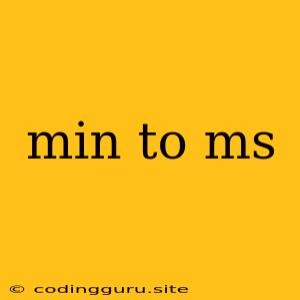Converting Minutes to Milliseconds: A Guide for Programmers
Working with time in programming often requires converting between different units. One common conversion is from minutes to milliseconds. While this might seem simple, understanding the process and its implications is crucial for accurate calculations and efficient code.
Why the Need for Conversion?
Many programming tasks involve handling time-related data. You might need to:
- Calculate durations: Determine how long a process takes, such as a function execution or a network request.
- Set timeouts: Specify a delay for events like loading data or displaying animations.
- Manage scheduling: Schedule tasks to occur at specific times.
In such scenarios, using milliseconds as the unit offers several advantages:
- Fine-grained control: Milliseconds provide a high level of precision, allowing for more accurate timekeeping.
- Consistency: Many programming libraries and frameworks utilize milliseconds as the default unit for time measurements.
- Improved compatibility: Using milliseconds ensures compatibility with various systems and platforms.
Understanding the Conversion Formula
The conversion from minutes to milliseconds is straightforward:
1 minute = 60 seconds
1 second = 1000 milliseconds
Therefore,
1 minute = 60 seconds * 1000 milliseconds/second = 60,000 milliseconds
This means you need to multiply the number of minutes by 60,000 to get the equivalent value in milliseconds.
Practical Examples
Let's illustrate the conversion process with some code examples:
JavaScript:
function minutesToMilliseconds(minutes) {
return minutes * 60000;
}
const minutes = 5;
const milliseconds = minutesToMilliseconds(minutes);
console.log(`${minutes} minutes is equal to ${milliseconds} milliseconds`);
Python:
def minutes_to_milliseconds(minutes):
return minutes * 60000
minutes = 2
milliseconds = minutes_to_milliseconds(minutes)
print(f"{minutes} minutes is equal to {milliseconds} milliseconds")
Java:
public class TimeConversion {
public static void main(String[] args) {
int minutes = 10;
long milliseconds = minutes * 60000;
System.out.println(minutes + " minutes is equal to " + milliseconds + " milliseconds");
}
}
These examples demonstrate how to implement the conversion within different programming languages.
Key Takeaways
- Converting minutes to milliseconds is a common task in programming for handling time-related data.
- The conversion factor is 60,000 milliseconds per minute.
- Using milliseconds offers greater precision and compatibility in programming.
Conclusion
Understanding the conversion between minutes and milliseconds is essential for working with time in programming. By utilizing the formula and examples provided, you can confidently perform accurate time calculations and enhance the efficiency of your code. Remember, the choice of time unit depends on your specific needs and the requirements of the project you are working on.
